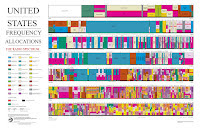On December 5, the House Energy and Commerce Committee unanimously passed a bill that would grant the Federal Communications Commission (FCC or Commission) clear authority to issue licenses for spectrum in the 2.5 GHz band won at auction and paid for by T-Mobile. It now heads to the House floor.
The 5G Spectrum Authority Licensing Enforcement Act (H.R. 5677) is companion legislation to S. 2787, a short and straightforward Senate bill that, as Free State Foundation Director of Policy Studies and Senior Fellow Seth L. Cooper described in a September 15, 2023, post to the FSF Blog, would do just one thing: establish a 90-day window within which the FCC incontrovertibly is authorized to grant those licenses for which T-Mobile paid $304 million but the agency had not yet processed when the Commission's spectrum auction authority lapsed on March 9, 2023. S. 2787 passed the full Senate without amendment by Unanimous Consent on September 21, 2023.
The underlying question – whether the FCC legally may grant these specific licenses in the absence of general spectrum auction authority – is open to debate. In a November 17, 2023, letter to Representative Anna G. Eshoo (D-CA), Chairwoman Jessica Rosenthal reiterated the Commission's position that it is barred by Section 309 of the Communications Act from doing so – and that, "[if] f the Commission were to expend funds to continue to process the licenses won in Auction 108 notwithstanding the sunsetting of our authority to do so, it would put the agency staff at risk of criminal penalties for violating the Antideficiency Act."On the other hand, and as Mr. Cooper highlighted in a July 2023 blog post, Joel Thayer has made a "convincing case" that the agency retains the requisite legal authority to proceed even in the absence of general spectrum auction authority.
As H.R. 5677's sponsor, Congressman John Joyce, M.D. (R-PA), stated in a press release, "[t]he 5G SALE Act would cut the red tape that has kept Pennsylvania families from accessing the high-speed internet that is vital for remote workers, students who use the internet to learn from home, and patients who use telehealth to heal from home."





